Caring for Your Senior Dog: Health Tips for Pet Parents
Learn how to keep your adopted senior dog healthy and happy with this essential care advice.
Learn how to keep your adopted senior dog healthy and happy with this essential care advice.
by Katie Koschalk, | August 26, 2024

JohnnyGreig / iStock
Adopting a senior dog can feel like welcoming a wise, furry grandparent into your home — complete with built-in manners, a penchant for napping, and an endless supply of love and loyalty. However, it’s important to keep in mind that senior dogs have unique healthcare needs. While helping your newly adopted senior dog stay healthy and comfortable requires some extra attention and care, it’s entirely manageable and so worth it.
In this guide, we’ll explore essential healthcare tips for senior dogs, from dietary adjustments to senior-appropriate toys to monitoring for health conditions. Whether you already have a senior dog in your family or you’re considering adopting one, these tips will equip you with the knowledge to give your senior companion the best golden years possible.
On average, dogs are considered “seniors” around the age of seven. But, this can vary depending on their size. Small dogs tend to live longer than large dogs so they may not reach their senior stride until around 11 or 12 years old. Medium-sized dogs are typically considered seniors around 10 years of age. Here’s a breakdown of when dogs of different sizes are considered seniors:
Small dogs: 11 years
Medium dogs: 10 years
Large dogs: 8 years
Giant dogs: 7 years
Adopting a senior dog has so many perks, but it also requires being prepared to meet their unique health needs. Below are some key health considerations to keep in mind.
Senior dogs should see a veterinarian more frequently than younger dogs. Biannual (rather than annual) check-ups are recommended to monitor their health closely. These visits allow for early detection of issues, which often makes treatment more effective and less invasive.
“It’s best to feed older dogs senior dog food because their nutritional needs change with age,” says Dr. Dwight Alleyne, a small practice veterinarian and veterinary health expert for JustAnswer. “On average, the age to switch to senior food is around seven years of age.”
Here’s what to look for when searching for the best food for your senior dog.
High in protein: Older dogs often stop producing as much protein on their own, increasing their need for it.
Lower in calories: Dogs tend to become less active as they age, which decreases their caloric needs. If your dog is putting on weight, it can help to switch to lower-calorie dog food.
Contains specific nutrients for joint health: To support joint health and mobility, choose a food that contains glucosamine, chondroitin, MSM, and/or omega-3 fatty acids. Alternatively, you can provide these supplements separately from the food (with your vet’s approval).
Look for dog foods labeled specifically for senior dogs, as they usually meet these criteria.
While senior dogs may not be as energetic as their younger counterparts, regular exercise is still crucial to their overall health. Exercise helps maintain their weight, supports joint health, and provides mental stimulation.
Senior dogs typically benefit from gentle, low-impact exercise like walking, swimming, and light play. Dr. Alleyne suggests tailoring the intensity and duration of exercise to their individual needs and capabilities. Always monitor your dog for signs of fatigue or discomfort, and adjust their activity level accordingly. Consult your vet to develop an exercise plan that suits your dog’s specific health status.
Arthritis and joint issues are common in senior dogs. Providing a comfortable bed with orthopedic support, ramps for easier access to furniture, and regular low-impact exercise like swimming or gentle walks can help maintain their mobility. “Joint supplements, such as glucosamine, chondroitin, and MSM can also be of great benefit,” Dr. Alleyne says.
Dental issues are common in older dogs due to the cumulative effects of time, diet, and eating habits, which contribute to oral decay. Poor oral health can escalate into serious problems like tooth loss and infections, making regular teeth-cleaning essential. Ideally, brush your dog’s teeth daily using dog-safe toothpaste. If daily brushing isn’t doable, aim for at least three times a week. During your dog’s biannual check-ups, your vet will assess your pet’s teeth and gums and determine if professional cleaning is necessary.
Also, keep an eye out for signs of dental issues that need veterinary attention, such as loose or missing teeth, bad breath, difficulty eating, and excessive drooling.
Maintaining a healthy weight is vital for senior dogs. Excess weight can exacerbate joint problems and lead to other health issues like diabetes and heart disease. Monitor your dog’s weight regularly and adjust their diet and exercise routine as needed to keep them fit. Avoid overfeeding and limit treats to no more than 10 percent of their daily caloric intake.
As with humans, dogs can experience cognitive decline. Keep your senior dog mentally stimulated with puzzle toys, interactive play, and social interaction with other dogs and humans, and by teaching them new tricks. This can help keep their minds sharp and prevent boredom.
Senior dogs are more prone to certain health conditions such as diabetes, cancer, kidney disease, heart problems, and vision loss. Regular blood tests and monitoring for changes in behavior, appetite, or energy levels can help catch these issues early. Always report any concerning symptoms to your vet promptly.
According to Dr. Alleyne, common signs of an underlying health issue include:
Increased drinking and urination
Unusual changes in weight or appetite
Decreased activity and energy
Lameness
Changes in skin or coat
Just because your dog’s coat is turning gray, that doesn’t mean their eyes won’t light up when they see their favorite squeaky toy. Still, older dogs might have different preferences and needs than younger ones.
If your dog has dental problems, avoid hard toys that could damage their teeth or be difficult for them to chew. Plush toys, a KONG filled with treats or kibble, soft balls, and puzzle toys are good choices. Regularly rotate toys to keep things interesting.
Here are a few ideas on how to make your home a senior-friendly space for dogs.
Making your home senior-friendly is essential for the comfort and safety of your older dog. This includes:
Ensuring easy access to key spots, such as their bed and food/water area
Using ramps or pet stairs to make it easier for them to get on furniture (if allowed)
Placing non-slip mats in certain areas of the house to prevent falls
Regardless of age, it’s crucial to dog-proof your home when bringing a new dog home. This entails:
Ensuring toxic items (such as cleaning supplies, medications, certain plants and foods) are out of reach
Keeping electrical cords hidden or inaccessible
Securing items like food and trash
Putting away toys and small objects
Securing unstable furniture
Closing windows and doors
Blocking off stairways (if needed)
Gather all the supplies you’ll need for your senior dog, including:
Age-appropriate food and treats
Bowls for food and water
A comfortable orthopedic bed
Toys suitable for older dogs
Grooming supplies like brushes and nail clippers
A collar, ID tag, and leash
Senior dogs are often overlooked in shelters, because many people want to adopt a puppy or younger dog. But these old souls have so much love to give and can make wonderful companions, too.
Calm and composed: Senior dogs are typically more relaxed and less energetic than their younger counterparts. They are often content with a leisurely walk or a cozy nap by your side, making them perfect companions for a peaceful household.
Known temperament: Senior dogs have fully developed personalities, so you can have a better idea of what to expect behavior- and temperament-wise than with a puppy. This can make finding a dog that fits well with your lifestyle and home environment easier.
Trained and experienced: Many senior dogs are already trained and know commands like sit, stay, and come. They often have good manners and are already housebroken, saving you the time and effort of training from scratch.
Less destructive: Older dogs are less likely to chew on your favorite shoes or tear up the furniture. Their lower energy levels mean they are generally less destructive and more content with simple pleasures.
Saves a life: Adopting a senior dog can literally be a lifesaver. Older dogs are often the last to be adopted and the first to be euthanized in overcrowded shelters. By choosing to adopt a senior dog, you’re giving them a second chance at life and freeing up space for another animal in need.
Adopting a senior dog gives them a loving home in their golden years. Senior dogs are typically calm, well-mannered, and grateful companions. They often require less training and have fully developed personalities.
A vet can estimate your dog’s age by examining their teeth, eyes, and overall physical condition. Dental wear and tear, the clarity of the eyes, and the condition of the fur and skin are common indicators used to determine a dog’s age.
To help your senior dog adjust to their new home, establish a consistent routine, and provide a quiet, comfortable space for them to retreat. Offer plenty of reassurance and gentle affection. Be patient while they acclimate to their new environment at their own pace.
For senior dogs with mobility issues, provide orthopedic beds, ramps, and non-slip mats. Provide gentle exercise and consult your vet about supplements or medications to manage pain and improve joint health.

Katie Koschalk is a freelance writer based in Northern California. Fusing her love and knowledge of animals with her journalism degree and years of professional writing, Katie is dedicated to improving the lives of pets and their caretakers by sharing helpful and accurate information. When she’s not at her desk, you can find her exploring trails with her Aussie, Hunter, cooking plant-based meals, and talking to her two cats, Jax and Sadie, in really ridiculous voices.

Adoption Advice
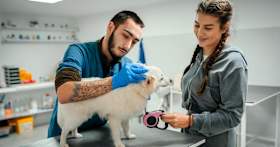
Adoption Advice

Adoption Advice
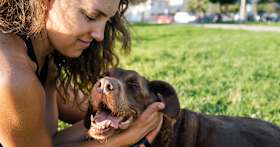
Adoption Advice
These studies prove that dogs’ awesomeness is more than just a vibe.

Adoption Advice
Learn what a rescue dog is and why these pups make the best buddies.
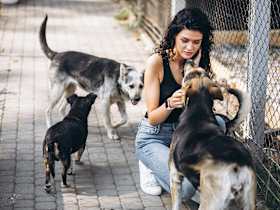
Shelters & Rescue

Behavior & Training
Some dogs just need a bit of training and encouragement to help them overcome undesired behaviors.
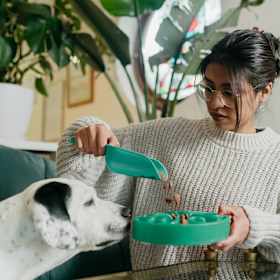
Pet Wellness
Curious about how to feed your new dog? This guide will answer your questions.

Adoption Advice
Not sure if you should adopt a younger or older pet? Here’s a guide to help you make the best decision.
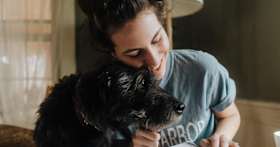
Adoption Advice
Considering adopting a senior dog? Our guide offers valuable tips for welcoming and caring for an older pup.

Adoption Advice
Did you adopt an old soul? These cute names with vintage vibes are perfect for your pup.

Adoption Advice